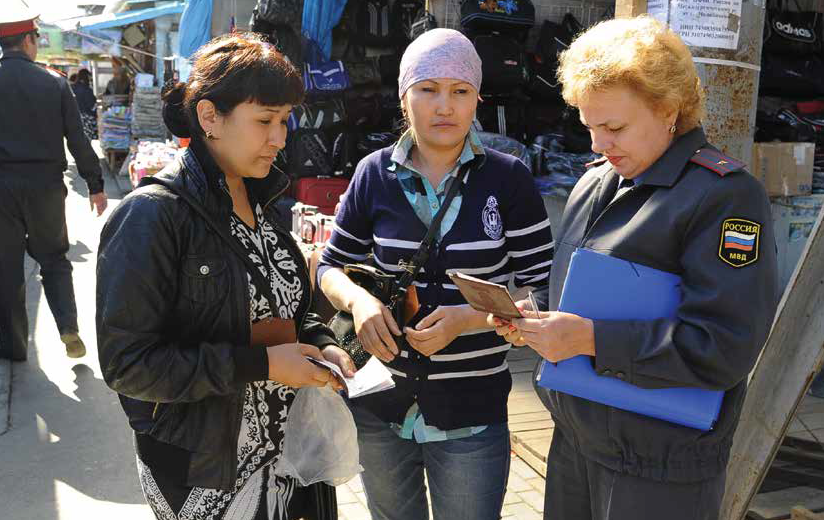FIDH Report
Kyrgyzstan Women and children from Kyrgyzstan affected by migration : an exacerbated vulnerability.
Since the mid-2000s, migration processes have affected an increasing number of Kyrgyz citizens. Approximately 50 000 Kyrgyz leave the country every year to work abroad, mainly to Russia and, to a lesser extent, to Kazakhstan.
According to various estimates, Kyrgyz migrants make up today some 650 0001 to 1 000 0002 of a total population of 5.836 million in Kyrgyzstan. Although migratory flows are mainly comprised of young males, feminization has increased. Currently, nearly 40% of Kyrgyz migrants in Russia are women, whereas Tajik and Uzbek women represent respectively less than 20% of the total number of migrants from each country.
Whilst poverty, unemployment and low wages characterize the life of many Kyrgyz, women tend to be more subject to the socio-economic marginalization that compels them to migrate. The main reason women choose to migrate – whether alone or with their husband or another member of their family – is to increase their earnings and to provide financial support to their family.
Migration is often considered as the only solution to improve their way of life.
With the feminization of migratory flows, it can be presumed that an increasing number of children migrate with one or both of their parents. Economic necessities may also compel children to migrate unaccompanied. According to the Russian Federal Service on Migration, in 2016, 18% of Kyrgyz documented migrants in Russia are children. Like migrant women, children who have migrated, whether alone or accompanied by their parents or another member of their family, are doubly vulnerable: as children and as individuals affected by migration.
Through the scope of the situation of women and children affected by migration and its consequences, this report aims to highlight the human rights violations faced by Kyrgyz migrants and the members of their family.
The risk of violations of the rights of women and children is particularly high because they present a double vulnerability: as children and women, and as individuals affected by migration. This vulnerability is exacerbated for those who are considered as “undocumented”.
Approximately 60% of Kyrgyz migrants do not have all the required documents to comply with current migration rules of countries of destination6. Women and children are at particular risk of discrimination; psychological, physical, and sexual violence and abuse; or, labor or sexual exploitation. Further, they may be subjected to exploitative conditions of work, inadequate living conditions, and access to health care – including access to safe sexual and reproductive health services including abortion for women and girls – and justice may be restricted. Undocumented migrants’ children are at particular risk of having no access to education in the countries of destination.
Violations of the rights may be committed by law enforcement representatives or non-state actors, including migrants’ employers, male Kyrgyz migrants, or citizens in the country of destination, especially in Russia where there is an increasing anti-migrant and xenophobic climate. Violence committed against Kyrgyz migrant women by Kyrgyz men – whether by a partner or strange countryman – is a worrying trend. Domestic violence is widespread in Kyrgyzstan. In countries of destination, women become even more vulnerable to abuse from their own partner as they are cut off from their family and communities. Difficult living conditions may exacerbate this violence. While an increasing number of unmarried women migrate from Kyrgyzstan, several cases of aggressions of Kyrgyz migrant women involved with non-Kyrgyz men perpetrated by young Kyrgyz men (the so-called “Kyrgyz patriots”) have been reported in Russia since the release of a video of the aggression of a young Kyrgyz woman, Sapargul, in 2012.
This report is based on qualitative interviews of 34 migrant women and migrants’ relatives, as well as interviews with local NGO representatives working with sending communities, women and children victims of abuses, and experts on migration and gender issues. These interviews were carried out during a six-day fact-finding mission in Kyrgyzstan (in the Bishkek and Osh provinces) in March 2016. This report is also based on testimonies of Kyrgyz migrants collected during a fact-finding mission in southern Kazakhstan in March 2016.
Read more HERE.


